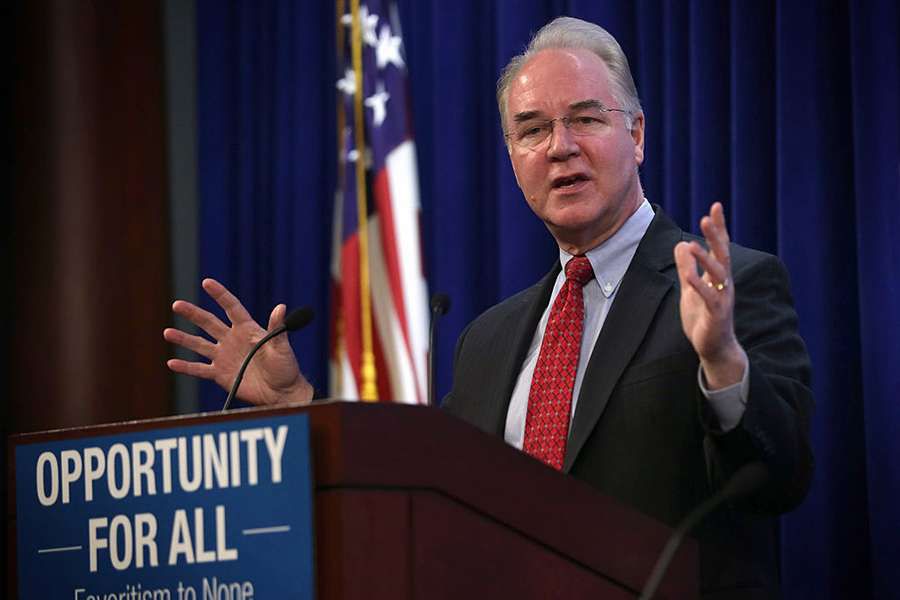Washington D.C., Nov 29, 2016 / 05:09 pm (CNA/EWTN News).- Pro-life groups praised President-elect Donald Trump’s announcement that he would name Rep. Tom Price (R-Ga.) to be the next Secretary of Health and Human Services.
“In particular, Rep. Price’s strong pro-life values and record to match make him the right man to reform an agency that has been marred by its aggressive abortion agenda,” said Ashley McGuire, senior fellow with The Catholic Association. “We are confident that Rep. Price will finally put an end to the anti-religious liberty HHS mandate, as well as introduce comprehensive reforms to restore the agency as one that genuinely promotes health care that respects human life and dignity,” she said in a statement.
As a member of Congress, Price has received a 100 percent rating from the pro-life group Susan B. Anthony List. Before his time as a six-term congressman, Price was an orthopedic surgeon who also taught doctors-in-training at the Grady Memorial Hospital in Atlanta.
“There is much work to be done to ensure we have a healthcare system that works for patients, families, and doctors; that leads the world in the cure and prevention of illness; and that is based on sensible rules to protect the well-being of the country while embracing its innovative spirit,” he stated on Tuesday.
While in Congress, Price sponsored a bill that was the Republicans’ answer to the Affordable Care Act. The Empowering Patients First Act of 2015 sought unsuccessfully to repeal the health care law and replace it with a new policy. The Susan B. Anthony List hailed the “excellent choice” of Rep. Price on Tuesday, noting his “pro-life record” and his efforts in Congress to defund Planned Parenthood. “As HHS Secretary, he will play a key role in developing a robust health care reform proposal that protects life and consciences, while promoting options for low-income individuals and families,” the group added.
Price’s appointment is significant for two reasons. If he replaces the current health care law, his policy could impact millions, especially those who purchased insurance on the state exchanges, received federal subsidies for insurance, or obtained coverage through Medicare. Additionally, Price’s department could do away with the law’s controversial mandate that virtually all employers must contraceptives, sterilizations, and abortion-inducing drugs in their health plans.
Price’s Empowering Patients First Act of 2015 would have replaced the health care law’s insurance mandate with tax credits for buying insurance. It would have prohibited insurers from denying coverage to patients with pre-existing conditions, provided they had 18 continuous months of coverage preceding their plan switch. And it would have allowed for federal grants to states with high-risk insurance pools.
Regarding these “high-risk insurance pools,” they were previously set up in 35 states before the health care law, but were “basically health insurance ghettos for people with pre-existing conditions — and expensive, poor quality ghettos at that,” wrote Sabrina Corlette of Georgetown University’s Health Policy Institute, in a Nov. 16 blog post.
This was because the pools only included people with serious health conditions, and so the insurance costs were high, she explained. The coverage was also “limited” and “high-deductible,” which meant that patients had to pay a lot out-of-pocket for medical expenses before their insurance kicked in.
Regarding the health care law’s birth control mandate, which spurred lawsuits from hundreds of religious non-profits and business owners claiming it infringed upon their religious beliefs, Price, in 2012 told a reporter “this is a trampling on religious freedom and religious liberty in this country.”
His 2015 bill would do away with such a mandate, along with all similar religious freedom conflicts: “Prohibits discrimination against any individual or health care entity that does not provide, cover, or pay for abortions, and allows for accommodations of the conscientious objection of a purchaser or health care provider when a procedure is contrary to the religious beliefs or moral convictions of such purchaser or provider.”
CNA reached out to Rep. Price’s office for further comment, including what he would do about the mandate as HHS Secretary, but did not receive a reply by deadline.
The U.S. Bishops’ Conference has spoken out about health care in the past, ultimately disapproving of the 2010 health care law because of concerns that taxpayer dollars would fund abortions in the plans set up under the law. However, the conference approved of the law’s expansion of Medicaid in the states and its goal of affordable health coverage for all.
“For decades, the bishops have consistently insisted that access to decent health care is a basic safeguard of human life and an affirmation of human dignity from conception until natural death,” a 2013 statement by the bishops’ Office of Domestic Social Development read. “They have advocated that health care reform legislation should 1) ensure access to quality, affordable, life giving health care for all; 2) retain longstanding requirements that federal funds not be used for elective abortions or plans that include them, and effectively protects conscience rights; and 3) protect the access to health care that immigrants currently have and remove current barriers to access,” the statement continued.
In November 2009, the bishops’ conference wrote in a letter to the U.S. Senate, “The bishops support the expansion of Medicaid eligibility for people living at 133 percent or lower of the federal poverty level.”

